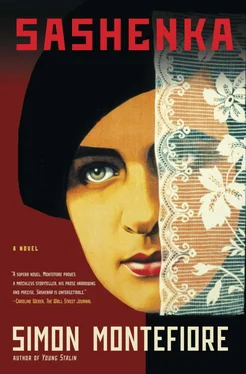“It would be best if you didn’t meet anyone up there,” Maxy had told her—so she expected the archive rat to jump out at her with the pimpled teenaged guards at any moment.
The long parquet corridors with lines of closed pine doors were hushed. The passages were much too hot—the winter heating was still on. Katinka checked the engraved plaques that announced a name and title on each door. She turned right and then right again until she heard the blare of opera—Glinka’s famous aria from A Life for the Tsar . When she turned again, the music got louder and louder as she approached the last door.
Agrippina Constantinovna Begbulatov, Director of Manuscripts read the plaque. Quite a name. Katinka listened at the door: the music was reaching a climax. Should she have made an appointment? No, Maxy had said that was too dangerous.
She knocked. No answer. She knocked again. Nothing. Katinka cursed obstructive dinosaurs like Satinov, the maddeningly rigid bureaucrats, the frustrations of this project, and just opened the door.
A very large, white-skinned woman of advanced years lay sleeping on a divan in her underwear, her eyes covered by a mask that read American Airways .
The room was hot, the music rippled out of a modern CD player, and the perfumes within were heady. Katinka had only a moment to register two fans whirring, piles of yellowed manuscripts and two mountainous thighs flowing over lacy stocking tops before the woman was pulling off her mask and coming toward her.
“How dare you barge in here! Who are you? Have you no manners? Are you some sort of cultureless philistine?” The whale-sized woman looked Katinka up and down as if she had never seen a young girl in denim and boots in the sacred archive. “Who gave you permission to burst in on me?”
“Umm, no one.” Katinka was lost momentarily.
“Then please leave and never return!” cried the woman, whose capacious milky bosoms strained even her rigidly structured brassiere.
“No, no.” Katinka was struggling now, blushing and stammering. “I was just asked to deliver something to you. It’s here…for you.” She raised the package.
The woman angrily yanked off a mauve hairnet. “I’m not expecting anything,” she said, peering craftily at the package. Katinka had little left to lose. She tried not to look at the garter belt, the generous flesh-colored underpants or any of the other eye-catching parts of the vision before her. “It’s a gift from…” She checked up and down the corridor, to suggest that the lady might not like her colleagues to witness the delivery of the package, “well, I’d prefer to tell you in private.”
The woman frowned, apparently remembering where she was and what she was wearing. “One minute!” She shoved Katinka out of the door and closed it. The music stopped. The door reopened.
“I’m Agrippina Begbulatov,” declared the woman, offering a firm, sweaty hand. “I like to take a nap in the middle of the day. Please, sit!”
Katinka sat on the red divan, on which she could instantly feel the heat radiating from where the director of manuscripts’ generous body had recently rested. Agrippina wore rouge and scarlet lipstick, a blue Soviet-style dress with lace over the décolletage and a pyramid of spangles on both hips. Katinka recognized the towering dyed-auburn coiffure of a Soviet grande dame of the Brezhnev era.
“You know I’m in charge of collecting all the memoirs of Party members so that they can be cataloged and filed in this special archive?” said Agrippina, sitting in a soft chair.
“Agrippina Constantinovna, thank you for receiving me,” said Katinka.
“My pleasure,” said Agrippina, coldly gracious, haughtily patient.
Katinka realized she had one second to explain herself—or ultimately face the Organs. When she started to speak, she hadn’t yet decided which lie to tell (indeed she had never told a lie, not a serious one, ever) and she knew that every lie would carry a high risk of exposure because all these top Communists knew one another, had been to school together, then to the Institute for Foreign Languages, after which they married each other and lived close to one another in their dachas and bred the next generation of Golden Youth. But already Katinka could hear her own voice sounding different, a lying voice.
“Comrade Agrippina Constantinova,” she started, “I bring you a gift from…Mariko Satinov. You know her, of course?”
Katinka clenched her teeth, trying to conceal her internal torment.
“Mariko?” queried Agrippina, head on one side.
“Yes.”
“I know Comrade Hercules Satinov,” said Agrippina reverently. “Not well of course, but I met him once at a concert at the Conservatoire and in the course of my work here, naturally.”
“Naturally,” agreed Katinka. “But you don’t know Mariko?”
Agrippina shook her head. “But she’s sent me a gift?”
“Yes, yes, by way of introducing me to you. She knows you, comrade, by name because of your dedicated and important work with her father, Comrade Marshal Satinov.”
Agrippina’s nostrils flared nobly as she puffed up her breast and seemed to swell with pride. “Comrade Satinov mentioned me?”
“Oh yes. I’m a friend of the family and he most certainly did mention you when he was telling me about how you helped him write his memoirs. He said he couldn’t have done the job without you.”
“Well, legendary Comrades Gromyko and Mikoyan, with whom I was fortunate enough to work on their books, said that their memoirs would not have been accomplished without my editorial skills.”
“That does not surprise me in the least,” said Katinka, finding that a lie, when it works, is an exhilarating thing, and soon leads to other lies. “Indeed, Comrade Satinov told me, ‘Young comrade, visit Agrippina Constantinovna, that master of editors, that keeper of the holy flame, and she’ll show you how we worked on the memoir, she’ll show you the drafts…’”
“You are a Communist, comrade…?”
“Katinka Vinsky. Yes, I was a Young Pioneer, then Komsomol and now I’m a historian writing a paper for Comrade Satinov about his role in the storming of Berlin.”
“Ah. There are so few young comrades left, how refreshing to meet one,” said Agrippina. She paused, and stopped smiling. “But why hasn’t Comrade Satinov called me? He knows he should make an appointment…”
“He is very ill,” said Katinka. “Lung cancer.”
“I heard. But I should ring his daughter, this Mariko, and check…” She moved toward the phones on the T-shaped desk.
“Wait, Agrippina Constantinova,” said Katinka, a little frantically, “Mariko’s nursing him today…at the Kremlevka Hospital. That’s why I just came without an appointment. Comrade Satinov, in a lucid moment, told Mariko to give you a certain gift—and you would know it was from him.” She patted her package.
“It’s for me?”
“Oh yes.”
“From Mariko Satinov and the marshal?” Her beetle eyes fixed on the gift.
Agrippina wiggled her bottom closer to the edge of her seat so that she was closer to the package. Katinka rested her hand on it protectively. “Do you have Marshal Satinov’s full memoirs here, the manuscript?” Katinka was following Maxy’s instructions.
“Yes, young girl, I do, in this pile.” A blue-ringed hand pointed at the heaps of yellowing manuscripts that covered every inch of the room. “You understand that our famous comrades dictated their memoirs to their assistants or to me personally and then it was my task to edit the book for the Party, according to the guidance of the Central Committee, leaving out any materials that might distract the public. Not all the episodes in Marshal Satinov’s memoirs, as with all the memoirs of our leaders, were included in the final version.”
Читать дальше












